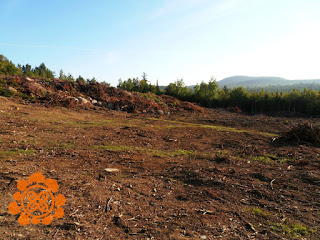Spring 2012
The cabin sits on top of a ridge just west of Mattimiscontis Mountain in Penobscot County, Maine. (United States) As you can see in the first photo, construction began in 2001. In the spring of 2012 an expansion of the cleared area in front of and down-slope to the river began.
The Field Preparation.....
While I had cleared some area over the years, establishing a field in the middle of this forest was going to take some help. |
| before major clearing |
 |
| Satellite view of Cabin before field expansion -- "after" not available yet. |
 |
| Chipper head on excavator |
 |
| Just after the chipping cut |
 |
| long view after chipping operation |
 |
| Part of the field a few weeks after chipping of the trees. |
The excavator began its work. The last photo shows the shaking of the topsoil out of the tree root balls. Don't you love the new view!
After the heavy work of the excavator was finished there was still a work to be done. Smoothing the soil, removing stones and small leftover wood. This will be ongoing for some time.
Pasture grasses including at least 3 varieties of nitrogen fixing clover were planted to stabilize and add organic matter to the soil. An application of lime and organic fertilizer was applied to help establish the new pasture.
 |
| cleanup continues - Thanks to a good friend for helping. |
The Sea Berry Orchard Planting.......
The cabin sits on a ridge facing east. With the field cleared in front, the view is better than ever. Opening the area has increased the breezes (good) and gusts in storms--this may prove to be an occasional problem as the remaining trees around the cabin adjust to the new environment
This view is from the upper field which is just below the cabin and shows the area of Seabuckthorn planting. I estimate it to be sightly over an acre of Seaberry plants.
The Seaberry plants, still mostly dormant. The photo above is about 40 plants.
After planting the bushes were staked with 4 foot bamboo stakes and tied with soft plastic flagging tape.
The different colored tapes have no significance. It is just what I had around the cabin. This view is from the lower field back up to the cabin. The plantings are somewhat difficult to see in this photo.
I enhanced the color somewhat and the Seabuckthorn orchard plantings are much more visible.
Well that is a summary to date for the first Seabuckthorn Orchard/Field in the United States. I know there are may people who have had some plants for years for personal use. I am not aware of any other potentially commercial operations in the US. I am though looking forward to being corrected on that "first" claim. Please let me know if you know of any others in the US.
This field, assuming a 50/50 split between male and female, should be producing over 5000 pounds of fruit per year. With culling and female replacement of excess male plants, the yield per acre could be 11,000 pounds. There are a lot of what if's in that estimate. Time will tell.
Another view of plantings. Some are staked and some are not yet staked in these photos. The foreground.in the top photo shows well the bare-root Sea berry plants after planting, before staking and pruning.
 |
| water retaining gel dip. |
This field, assuming a 50/50 split between male and female, should be producing over 5000 pounds of fruit per year. With culling and female replacement of excess male plants, the yield per acre could be 11,000 pounds. There are a lot of what if's in that estimate. Time will tell.























Comments
Post a Comment